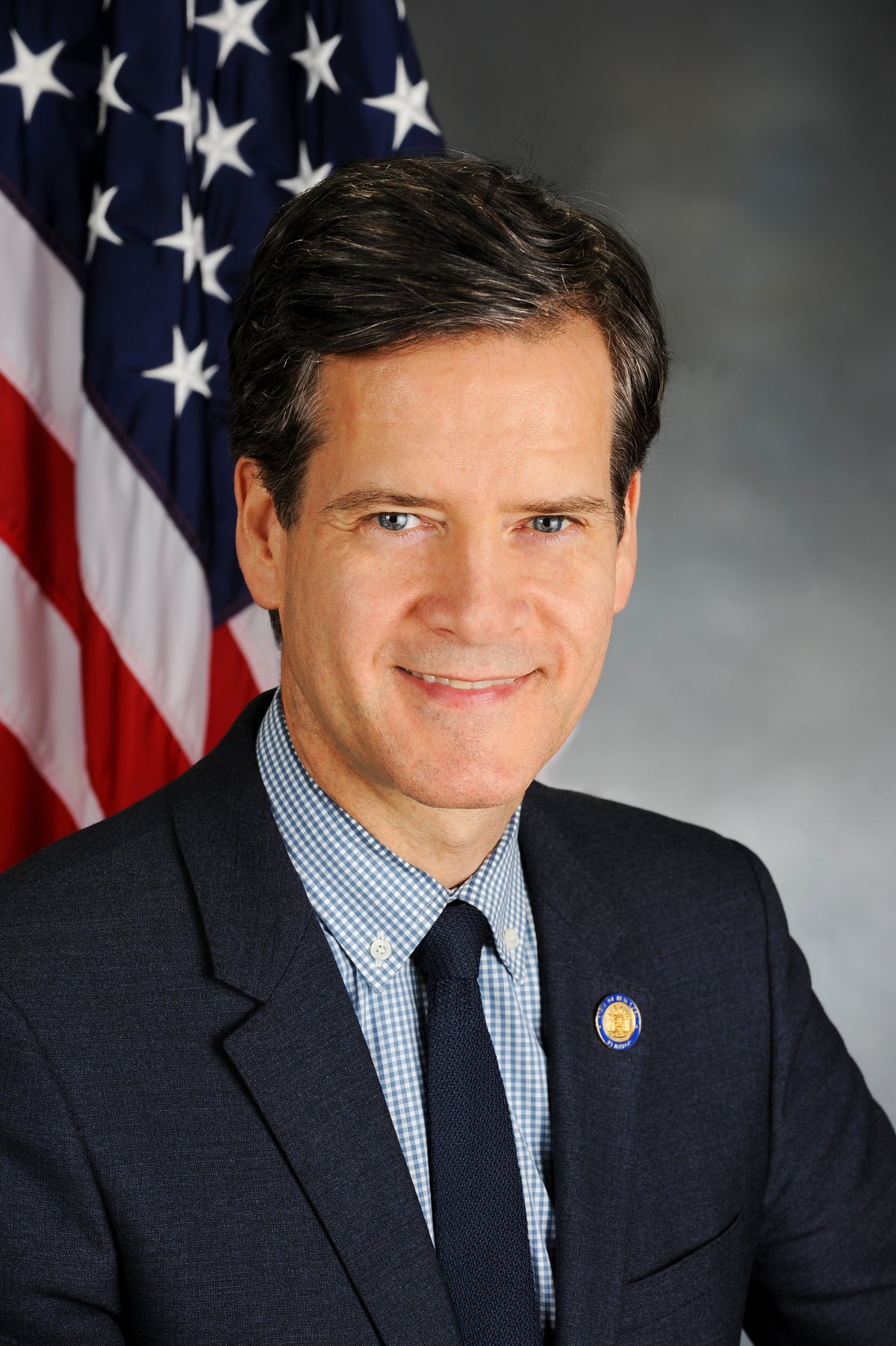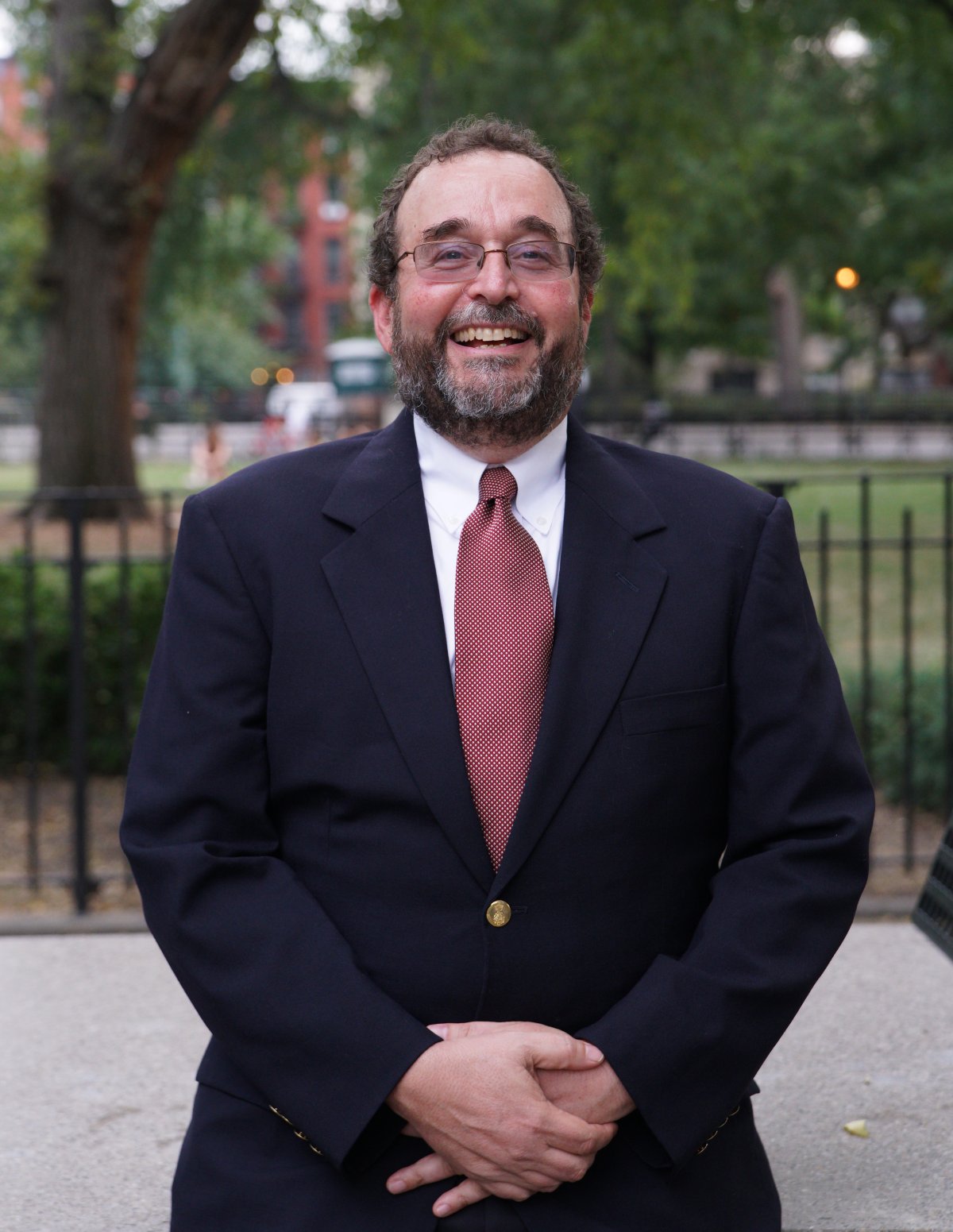BY LINCOLN ANDERSON | The election for the 27th state Senate District features two candidates who are running progressive campaigns — but one adds his campaign is also “prophetic.”
Brad Hoylman is seeking re-election to a third term. Challenging him is Rabbi Stephen Roberts, in his first-ever run for elected office.
The Senate district includes Greenwich Village, the East Village and Hudson Square, Stuyvesant Town / Peter Cooper Village, Chelsea and Hell’s Kitchen, Midtown and the Upper West Side.
Hoylman is running on the Democratic and Working Families Party lines. Roberts, in something not seen in 20 years in a New York state Senate election, is running as an independent, under no party line. There is no Republican candidate on the ballot.
Both candidates are gay, married and live in the Village. Hoylman is currently the only openly gay member of the state Senate.

Roberts is a healthcare chaplain who has ministered during disasters, including 9/11, and currently heads a business helping chaplains get board certification. He is also a part-time rabbi, conducting services once a month at a synagogue in Appalachian North Carolina.
A former chairperson of Community Board 2, Hoylman has an established reputation as a reform-minded and ethical politician. Yet Roberts charges Hoylman isn’t doing enough to change Albany’s broken political culture.
“Why I’m running,” Roberts said, “is the issue of ethics and corruption in Albany.”
Specifically, Roberts accused Hoylman, over the past year and a half, of taking several campaign contributions that exceeded the allowable limit of $5,000 for corporations. Among other campaign finance reforms, Roberts advocates capping contributions from individuals at $2,700, which is the limit for presidential campaigns. In turn, he accuses Hoylman of taking about a dozen contributions above that limit — even though it’s currently not illegal to do so.
Roberts said what really spurred him to run was when the state Legislature, before adjourning its session last June, legalized fantasy football gaming but not ethics reforms. He said Bernie Sanders’s urging average Americans to seek office also inspired him, as did Sanders’s being an independent.

Yet Hoylman is a leading voice for campaign finance reform in Albany. Any campaign contributions to him that exceeded the allowable limit were returned, he stated, adding it’s all documented on the State Board of Elections Web site. Plus, he said, the error was on the part of the contributors for giving him too much in the first place.
Roberts also said, if elected, he would advocate for creating more middle-income housing, and for legalizing marijuana — then using the taxes from pot sales to pay for healthcare for currently uninsured New Yorkers.
“I want to end the school-to-prison pipeline,” he added, regarding decriminalizing pot.
Noting that his home, on West St., was destroyed by flooding from Superstorm Sandy, Roberts also stressed, “Albany must create a larger response plan to global warming.”
As for endorsements, Hoylman is backed by a phalanx of local politicians and Democratic clubs. Roberts, on the other hand, said, “The most important endorsement will come on Nov. 8, when people support me.”
Asked about his own campaign finances, Roberts similarly said, “I don’t need money to win, I need voters to win.”
Roberts is not taking LLC contributions or PAC contributions, and is limiting campaign contributions to $2,700.
For his part, Hoylman said he is doing exactly what Roberts says he would do, if elected, on campaign finance reform — but gridlock in the Legislature is the problem.
“I sponsor and co-sponsor every major piece of campaign finance and ethics reform legislation in Albany,” Hoylman said. However, he added, “But I’m not going to unilaterally disarm. There is a battle in November. It’s very important that the Democrats win. There is a one-seat difference. We need to pass campaign finance reform — which includes public financing of campaigns — a bill I also sponsor. These bills are pending; but we need to win the Senate back from the Republicans to pass them.”
In other words, Hoylman said, he’s not going to cap contributions to his campaign voluntarily when the Republicans won’t do it for theirs.
“We have seats, particularly in the Hudson Valley and Long Island, that are vulnerable,” he said. “And that’s why I raise money.”
Hoylman, in turn, can give some of his campaign funds to Democratic colleagues to help with their races.
“I’m eager to donate to other Democratic state Senate candidates,” he said. “It’s the local version of what U.S. Senator Chuck Schumer is doing at the national level. Schumer recently announced that he had transferred more than $4 million to help elect fellow Democrats.”
Hoylman is also the prime sponsor of a state Senate bill to limit legislators’ outside income, which was former Assembly Speaker Sheldon Silver’s downfall. He added that he was the first legislator to call for Silver to resign after corruption charges against him were announced this past January.
Another bill Hoylman supports would close the “LLC loophole” that helps special interests influence elections with their contributions.
Democrats’ gaining control of the Senate has impacts ranging far beyond campaign finance and ethics reform, though, he noted.
“We need to codify Roe v. Wade, and that needs a Democratic state Senate,” Hoylman said. “At the moment, the federal government is protecting New York State from encroachments on reproductive rights. We are vulnerable to the whims of the next Supreme Court. We have to win [back the state Senate] in order to make change — that’s the bottom line.”
On other issues, in a signature piece of legislation, Hoylman is the sponsor of the Child Victims Act, which would eliminate the statute of limitations in civil cases of child sexual abuse and give victims older than age 23 a “one-year lookback” period to file a claim. Again, the Republicans are blocking this bill.
On marijuana, Hoylman said he supports legalizing it “and using it as a tax base.” On healthcare insurance, he backs the single-payer plan being pushed by Assemblymember Richard Gottfried.
He said he’s not only concerned about middle-class housing, but preserving the district’s public-housing stock. Hoylman also noted he was arrested last year outside the governor’s office protesting for stronger rent protections.
Hoylman earned EPL Environmental Advocates’ “Legislator of the Year” award last year for his leading effort to make GE finish its cleanup of PCB’s from the Hudson River and his staunch opposition to fracking.
He recalled how he stood up on the floor of the capitol and challenged Republican state Senators about their denials of global warming.
A leader on L.G.B.T. rights, he pointed out, “I have led the charge to end gay conversion therapy.”
And then there’s Hoylman’s decade of activism in the community. He listed fighting overdevelopment and New York University’s expansion, and advocating for a new school at 75 Morton St. and a Village AIDS memorial as a few of the local high-profile causes he has been active on.
In short, Hoylman said of Roberts’s challenge: Bring it on!
“It’s actually healthy and helpful and instructional,” he said, “and part of my job as an elected official and a candidate — I welcome it.”
Asked if he would debate Roberts, he said, “Sure! It’s always a healthy, positive thing.”
Roberts said he thought something else he shared with Hoylman was that they are both Jewish. But The Villager told him that probably was not the case. Roberts was very curious to learn more about this.
While Hoylman’s husband, David Sigal, is Jewish, Hoylman was raised Christian in West Virginia. As for Roberts, he is originally from Florida, and moved to New York to attend Hebrew Union College, on W. Fourth St.
Hoylman is a member of Congregation Beth Simchat Torah, the city’s leading L.G.B.T. synagogue, which recently relocated from rented space in Westbeth to a building it now owns in Chelsea.
Basically, Roberts said people he has spoken to in the district think Hoylman is Jewish, and he implied that Hoylman is perhaps portraying himself as something that he is not.
Hoylman took that charge very seriously, and went to some lengths to explain his feelings on the subject.
“I’m a member of a temple, a transplanted New Yorker, from a small town in West Virginia, someone who had a great advantage given to them through education,” Hoylman said. “I’d like to see that educational opportunity for all New Yorkers. I wasn’t born a New Yorker, but I’ll die one.
“I strongly believe that an individual’s religious convictions are irrelevant to public office,” he continued. “But since you asked, I’m a proud member of Congregation Beit Simchat Torah. I certainly don’t need to pretend to be anything I’m not. So while I’ve not formally converted yet, I do identify with my husband’s Jewish faith. I follow exclusively his religious traditions and we’re raising our daughter in a Jewish home. C.B.S.T. is where we were married and had our daughter’s baby-naming.”
Rabbi Sharon Kleinbaum, who has led C.B.S.T. for 25 years, said of Roberts’s questioning Hoylman’s religious identity, “It’s a non-issue. Brad has been a longtime member of the synagogue. His daughter is in our Hebrew school, and will have her bat mitzvah here when she is old enough. It’s a non-issue whether he’s formally converted. He’s a full member of the synagogue and an active participant. Brad does more to contribute to our Jewish community and synagogue than many people who are Jewish. Deeds count.”
Councilmember Corey Johnson is a familiar presence there, too, she said, noting, “Corey is not a member, but we like to think of him as an honorary member.”
Assemblymember Deborah Glick is also a longtime member, she added.
Allen Roskoff, president of the Jim Owles Liberal Democratic Club, said he didn’t know much about Roberts, but deemed him a minor challenge. Why does he feel the need to challenge Hoylman, of all people? he asked. Indeed, most observers would say it would take a miracle for the rabbi to win.
“I don’t really have time to focus on such insignificant races,” Roskoff said. “It’s ridiculous. Brad is very popular and well-liked in the district. He’s smart. He’s absolutely attentive to the community. He’s going places. He’s a player.”
As for Roberts’s doubts about Hoylman’s religion, Roskoff scoffed, “It’s totally irrelevant. It’s very Trump-esque to bring somebody’s religion into the race.”
Regarding Roberts’s criticism of fantasy football gaming being passed, Roskoff said, “It wasn’t Brad’s bill — and so what? You want to blame someone? Blame the five I.D.C. [Independent Democratic Conference] people who f—ed the Democratic Party and have stopped anything from happening.”
Simply put, he said, Hoylman’s an upstanding, straight-shooting politician, adding, “And I don’t say nice things about many people!”
Don’t try telling that to Roberts, though.
“Brad seems to embody Albany’s culture of corruption,” he charged. “One cannot legislate morality. But the voters can elect moral and ethical people to work for them — who do what they say and say what they do.”
The voters will decide on Nov. 8. So be it.

































